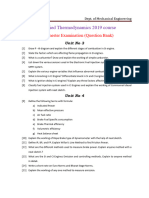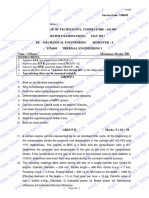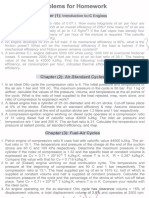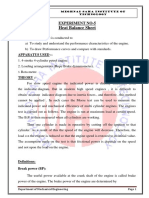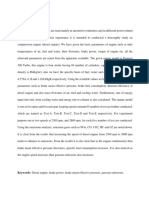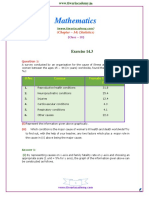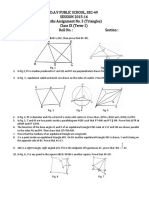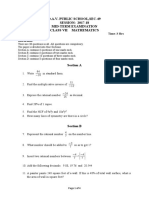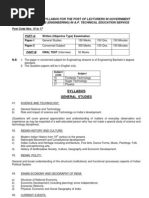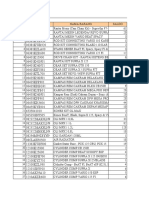0 ratings0% found this document useful (0 votes)
70 viewsAssignment 5 ICGT Unit 5
Assignment 5 ICGT Unit 5
Uploaded by
Sunny BhatiaThe document contains questions for an exam on internal combustion engines and gas turbines. It includes short answer questions about engine performance parameters and methods to evaluate friction power. It also has long answer questions about measuring indicated power on a multi-cylinder engine and defining dynamometers. Numerical problems ask students to calculate performance metrics like efficiency and air/fuel consumption based on engine test data.
Copyright:
© All Rights Reserved
Available Formats
Download as PDF, TXT or read online from Scribd
Assignment 5 ICGT Unit 5
Assignment 5 ICGT Unit 5
Uploaded by
Sunny Bhatia0 ratings0% found this document useful (0 votes)
70 views2 pagesThe document contains questions for an exam on internal combustion engines and gas turbines. It includes short answer questions about engine performance parameters and methods to evaluate friction power. It also has long answer questions about measuring indicated power on a multi-cylinder engine and defining dynamometers. Numerical problems ask students to calculate performance metrics like efficiency and air/fuel consumption based on engine test data.
Copyright
© © All Rights Reserved
Available Formats
PDF, TXT or read online from Scribd
Share this document
Did you find this document useful?
Is this content inappropriate?
The document contains questions for an exam on internal combustion engines and gas turbines. It includes short answer questions about engine performance parameters and methods to evaluate friction power. It also has long answer questions about measuring indicated power on a multi-cylinder engine and defining dynamometers. Numerical problems ask students to calculate performance metrics like efficiency and air/fuel consumption based on engine test data.
Copyright:
© All Rights Reserved
Available Formats
Download as PDF, TXT or read online from Scribd
Download as pdf or txt
0 ratings0% found this document useful (0 votes)
70 views2 pagesAssignment 5 ICGT Unit 5
Assignment 5 ICGT Unit 5
Uploaded by
Sunny BhatiaThe document contains questions for an exam on internal combustion engines and gas turbines. It includes short answer questions about engine performance parameters and methods to evaluate friction power. It also has long answer questions about measuring indicated power on a multi-cylinder engine and defining dynamometers. Numerical problems ask students to calculate performance metrics like efficiency and air/fuel consumption based on engine test data.
Copyright:
© All Rights Reserved
Available Formats
Download as PDF, TXT or read online from Scribd
Download as pdf or txt
You are on page 1of 2
MRIIRS
Faculty of Engineering & Technology
Automobile Engineering
Department: Automobile Engineering Semester: IV AU
Subject: Internal Combustion Engine & Gas Turbine Maximum Marks: 10
Tutorial: 5 Unit : 5
Short answer questions
Q1. What do understand by performance of I.C.Engine? What parameters are required to
evaluate the performance of an engine?
Q2. State various methods available for finding friction power of an engine.
Q3. Justify the statement “Mean effective pressure is the true indication of the relative
performance of different engines”.
Q4. What is a heat balance sheet? Why is it required?
Long Answer Questions
Q5. Describe how the I.P of a multi-cylinder engine is measured?
Q6. What are Dynamometers? Derive an expression for brake power using Rope Brake
Dynamometer.
Numericals
Q7. A 4-s petrol engine delivers 35kw with a mechanical efficiency of 80 % .The fuel
consumption of the engine is 0.4 kg/kwhr and the A/F ratio is 14:1. The heating value of
the fuel is 43000kj/kg. Find
a) indicated power,
b) friction power,
c) break thermal efficiency,
d) fuel consumption/hr,
e) Air consumption/hr.
Q8. The following observations were recorded in a test of one hour duration on a single
cylinder oil engine working on four stroke cycle:
Bore = 300 mm
Stroke = 450 mm
Fuel used = 8.8 kg/hr
Calorific value of fuel = 41800 kJ/kg
Average speed = 200 rpm
Mean effective pressure = 5.8 bar
Brake friction load (W-S) = 1860 N
Quantity of cooling water = 650 kg/hr
Temperature rise = 22 oC
Diameter of the brakewheel = 1.22 m
Calculate mechanical efficiency and brake thermal efficiency. Draw heat balance for the
test on the percentage basis indicating the content of each item in the balance. What
inference can be drawn from the results about the performance of the engine?
Q9. From the data given below, calculate indicated power, brake power and draw a heat
balance sheet for a two stroke diesel engine run for 20 minutes at full load:
Speed = 350 rpm
mep = 3.1 bar
Net Brake Load = 640 N
Fuel Consumption = 1.52 kg
Cooling water = 162 kg
Water inlet temperature = 30 oC
Water outlet temperature = 55 oC
Air used per kg of fuel = 32 kg
Room temperature = 25 oC
Exhaust temperature = 305 oC
Cylinder diameter = 200 mm
Stroke = 280 mm
Brake diameter = 1m
Calorific value of fuel = 43900 kJ/kg
Steam formed per kg of fuel in the exhaust = 1.4 kg
specific heat of steam in exhaust = 2.09 kJ/kg K
Specific heat of dry exhaust gases = 1 kJ/kg K.
What inference can be drawn from the results about the performance of the engine?
You might also like
- 2008 Chevrolet Malibu Service Repair Manual PDFDocument19 pages2008 Chevrolet Malibu Service Repair Manual PDFfjjskekkdmemNo ratings yet
- Heat Balance Test On Diesel EngineDocument6 pagesHeat Balance Test On Diesel EngineMathew John0% (2)
- S06 Deutz-912-913 (F3L-F6L)Document79 pagesS06 Deutz-912-913 (F3L-F6L)atelier100% (8)
- Technical Data-OM471LA.E5-2-360 kW-2400 Nm-D471.945-Off Highway US Tier 4 (With DPF)Document6 pagesTechnical Data-OM471LA.E5-2-360 kW-2400 Nm-D471.945-Off Highway US Tier 4 (With DPF)Samuel SQNo ratings yet
- Problem On IC-Engine Testing-1Document7 pagesProblem On IC-Engine Testing-1SouravSaw100% (1)
- Tutorial - ICEDocument4 pagesTutorial - ICESuchi Suchi SuchiNo ratings yet
- ATD University QB SolutionsDocument78 pagesATD University QB Solutionstitanx2334No ratings yet
- I C EnginesDocument3 pagesI C EnginesRotten AppleNo ratings yet
- A7dca BSDZVCFDocument2 pagesA7dca BSDZVCFRAJANo ratings yet
- Problems On Testing and Performance of IceDocument5 pagesProblems On Testing and Performance of Iceasjdkfjskaldjf;klasdfNo ratings yet
- ME 416 (ME 4) Internal Combustion Engine Practice ProblemsDocument3 pagesME 416 (ME 4) Internal Combustion Engine Practice ProblemsMark MagdaleNo ratings yet
- Power Plant Engineering 4Document12 pagesPower Plant Engineering 4Anushree GhoshNo ratings yet
- Lecture 7 - I.C Engine - Part 2Document18 pagesLecture 7 - I.C Engine - Part 2Khushank MNo ratings yet
- Question Bank For UT 2 On Module 6 of Thermal EngineeringDocument1 pageQuestion Bank For UT 2 On Module 6 of Thermal Engineeringgaupatekar43No ratings yet
- IC Engine Testing and Emission Control 16 MarksDocument7 pagesIC Engine Testing and Emission Control 16 Marksvaishnavpawar056No ratings yet
- TE Assignment IDocument6 pagesTE Assignment Iragunath LakshmananNo ratings yet
- Lab-Exercise-3-Diesel-Power-Plant (1)Document2 pagesLab-Exercise-3-Diesel-Power-Plant (1)anakngpoooNo ratings yet
- ICE - UNIT V - Important QuestionsDocument5 pagesICE - UNIT V - Important QuestionsaravindNo ratings yet
- Tutorial AssignmentDocument5 pagesTutorial AssignmentAnup ChauhanNo ratings yet
- Applied Thermodynamics Unit-Ic Engines Assaignment - 01: Bharath .A, Lecturer, Dsce, BangaloreDocument4 pagesApplied Thermodynamics Unit-Ic Engines Assaignment - 01: Bharath .A, Lecturer, Dsce, BangaloreMatthew Smith0% (1)
- Assignment2 - 110006 - Elements of Mechenical EngineeringDocument6 pagesAssignment2 - 110006 - Elements of Mechenical EngineeringSaniya Jumani0% (1)
- Instructions:: No of Pages: 2 Course Code: 15M405Document2 pagesInstructions:: No of Pages: 2 Course Code: 15M405CRAZY PIANO PLAYERNo ratings yet
- Fallsem2013-14 Cp0084 Asgn03 Assignment3Document2 pagesFallsem2013-14 Cp0084 Asgn03 Assignment3Agnibh PrakashNo ratings yet
- The IC Engine Criterion's, Lecture 3, IC Engine, (Week 7)Document19 pagesThe IC Engine Criterion's, Lecture 3, IC Engine, (Week 7)Shakeel MohmandNo ratings yet
- P R o B L e M S o F P R A C T I C e S O F B A S I C A N D A P P L I e D T H e R M o D y N A M I C S I - C - E N G I N eDocument21 pagesP R o B L e M S o F P R A C T I C e S O F B A S I C A N D A P P L I e D T H e R M o D y N A M I C S I - C - E N G I N eAnonymous ncBe0B9bNo ratings yet
- Atf Ice Tut1-7Document8 pagesAtf Ice Tut1-7Atheer SatNo ratings yet
- Assignment - 1Document3 pagesAssignment - 1yared abebeNo ratings yet
- ICE RevisionDocument4 pagesICE RevisionjehadyamNo ratings yet
- Expt No. 6Document8 pagesExpt No. 6Ariston D. TrazonaNo ratings yet
- ICE Assignment 4Document3 pagesICE Assignment 4Abhimanyu Ohlyan33% (3)
- ThermalDocument40 pagesThermalvijayakumarNo ratings yet
- Exp-5 Heat Balance Sheet PDFDocument5 pagesExp-5 Heat Balance Sheet PDFNarender NarruNo ratings yet
- Exp-5 Heat Balance SheetDocument5 pagesExp-5 Heat Balance SheetRabeek RajaNo ratings yet
- Load Test On Single Cylinder 4s Diesel EngineDocument8 pagesLoad Test On Single Cylinder 4s Diesel EngineMathew JohnNo ratings yet
- دليل مختبر محركاتDocument69 pagesدليل مختبر محركاتabood mohammadNo ratings yet
- Sheet 5 ICEDocument2 pagesSheet 5 ICEAtheer SatNo ratings yet
- Problems On Performance Testing of Ic Engines: WXN BPDocument4 pagesProblems On Performance Testing of Ic Engines: WXN BPaldrin sardillaNo ratings yet
- IC Engine Parameters QuestionsDocument2 pagesIC Engine Parameters QuestionsMohamed MounirNo ratings yet
- Nhom 10 - Chuong 4Document10 pagesNhom 10 - Chuong 4Alfie StacyNo ratings yet
- A. B. C. D. E.: Where R (D + D) /2 or (D + T) /2 M, and W (Load) (S - S) KGDocument5 pagesA. B. C. D. E.: Where R (D + D) /2 or (D + T) /2 M, and W (Load) (S - S) KGal hasan kanonNo ratings yet
- ICE Assignment 30072016 043902AM PDFDocument6 pagesICE Assignment 30072016 043902AM PDFJayPatelNo ratings yet
- Fourth Year - Mechanical Power Eng. Dept. First Term - 2016/2017 Internal Combustion EnginesDocument5 pagesFourth Year - Mechanical Power Eng. Dept. First Term - 2016/2017 Internal Combustion EnginesMohamed SamyNo ratings yet
- Diesel Engine ReportDocument21 pagesDiesel Engine Reportengrvj57No ratings yet
- I.C. Engine Performance Test Single Cylinder Diesel EngineDocument6 pagesI.C. Engine Performance Test Single Cylinder Diesel EngineNavneet KumarNo ratings yet
- IC Engine WorksheetDocument4 pagesIC Engine WorksheetNIKNo ratings yet
- Benha University Shoubra Faculty of EngineeringDocument2 pagesBenha University Shoubra Faculty of Engineeringabddul128No ratings yet
- Performace Test On Otto Engine With Premium and Pertamax FuelDocument12 pagesPerformace Test On Otto Engine With Premium and Pertamax FuelRifanni JuliantiNo ratings yet
- Internal Combustion Engine Lab/heat Engine Lab ExperimentsDocument19 pagesInternal Combustion Engine Lab/heat Engine Lab ExperimentsMathew John0% (2)
- ECS2 Lab Report - GensetDocument7 pagesECS2 Lab Report - GensetUI Career ExpoNo ratings yet
- Assignment Unit 1 - 4 Div A & BDocument6 pagesAssignment Unit 1 - 4 Div A & Bmailsk123No ratings yet
- Adv IC Engines Assignment No 2.Document3 pagesAdv IC Engines Assignment No 2.Madhupriya KalahastiNo ratings yet
- Example Problems (Engine Design)Document3 pagesExample Problems (Engine Design)Sarmad Altaf Hafiz Altaf HussainNo ratings yet
- 3 - IcDocument28 pages3 - Icمصطفى العباديNo ratings yet
- IC EnginesDocument2 pagesIC EnginesVinay Korekar0% (1)
- I.C. Engine Performance Test Single Cylinder Diesel EngineDocument5 pagesI.C. Engine Performance Test Single Cylinder Diesel EngineNavneet KumarNo ratings yet
- Heat Balance Diesel Rope Brake-6Document3 pagesHeat Balance Diesel Rope Brake-6Arup NaskarNo ratings yet
- End Sem Question PaperDocument3 pagesEnd Sem Question PaperAyesha IshuNo ratings yet
- Thermal I ManualDocument38 pagesThermal I Manualsakthi velNo ratings yet
- Angelo S. Tamaño: Power Plant EngineeringDocument22 pagesAngelo S. Tamaño: Power Plant EngineeringNeil RubsNo ratings yet
- Section - B (Attempt All The Questions) - 50 MarksDocument2 pagesSection - B (Attempt All The Questions) - 50 MarksYash ShuklaNo ratings yet
- ICGT MCQ Without SolutionDocument8 pagesICGT MCQ Without SolutionSunny BhatiaNo ratings yet
- Faculty of Engineering and Technology: Sessional Test 1-February 2020Document2 pagesFaculty of Engineering and Technology: Sessional Test 1-February 2020Sunny BhatiaNo ratings yet
- MCQ IcgtDocument28 pagesMCQ IcgtSunny BhatiaNo ratings yet
- Index OF BOOKDocument26 pagesIndex OF BOOKSunny BhatiaNo ratings yet
- UNIT 2 ICGT Assignment 2 3.2.2021Document1 pageUNIT 2 ICGT Assignment 2 3.2.2021Sunny BhatiaNo ratings yet
- Composite Materials and ProcessingDocument105 pagesComposite Materials and ProcessingSunny BhatiaNo ratings yet
- SOM GATE TEST (Preview) Microsoft FormsDocument4 pagesSOM GATE TEST (Preview) Microsoft FormsSunny BhatiaNo ratings yet
- MCQ For TOM With SolutionDocument11 pagesMCQ For TOM With SolutionSunny BhatiaNo ratings yet
- Design Analysis of Composite LaminatesDocument14 pagesDesign Analysis of Composite LaminatesSunny BhatiaNo ratings yet
- 9 Maths NcertSolutions Chapter 14 3Document16 pages9 Maths NcertSolutions Chapter 14 3Sunny BhatiaNo ratings yet
- 9 Maths NcertSolutions Chapter 14 4 PDFDocument6 pages9 Maths NcertSolutions Chapter 14 4 PDFSunny BhatiaNo ratings yet
- NCERT Upto 14.2Document9 pagesNCERT Upto 14.2Sunny BhatiaNo ratings yet
- Exemplar Ch.14 PDFDocument21 pagesExemplar Ch.14 PDFSunny BhatiaNo ratings yet
- 9 Maths NcertSolutions Chapter 14 2Document9 pages9 Maths NcertSolutions Chapter 14 2Sunny BhatiaNo ratings yet
- Eron S Ormula: WWW - Tiwariacademy. inDocument3 pagesEron S Ormula: WWW - Tiwariacademy. inSunny BhatiaNo ratings yet
- Case Study MathsDocument2 pagesCase Study MathsSunny BhatiaNo ratings yet
- Observe The Picture and Answer The Given QuestionsDocument6 pagesObserve The Picture and Answer The Given QuestionsSunny BhatiaNo ratings yet
- D.A.V. Public School, Sec-49 SESSION 2015-16 MATHS ASSIGNMENT NO.1 (Real Numbers) Class IX (Term-1)Document3 pagesD.A.V. Public School, Sec-49 SESSION 2015-16 MATHS ASSIGNMENT NO.1 (Real Numbers) Class IX (Term-1)Sunny BhatiaNo ratings yet
- D.A.V Public School, Sec-49 SESSION 2015-16 Maths Assignment No. 5 (Triangles) Class IX (Term-1) Name: Roll No.: SectionDocument2 pagesD.A.V Public School, Sec-49 SESSION 2015-16 Maths Assignment No. 5 (Triangles) Class IX (Term-1) Name: Roll No.: SectionSunny BhatiaNo ratings yet
- 0D.A.V. Public School, Sec-49 SESSION: 2017-18 Mid-Term Examination Class Vii Mathematics Answer KeyDocument6 pages0D.A.V. Public School, Sec-49 SESSION: 2017-18 Mid-Term Examination Class Vii Mathematics Answer KeySunny BhatiaNo ratings yet
- Keywords: Tmac Uxy Tmac yDocument3 pagesKeywords: Tmac Uxy Tmac ySunny BhatiaNo ratings yet
- D.A.V. Public School, Sec-49 SESSION: 2017-18 Mid-Term Examination Class Vii MathematicsDocument4 pagesD.A.V. Public School, Sec-49 SESSION: 2017-18 Mid-Term Examination Class Vii MathematicsSunny BhatiaNo ratings yet
- Utility: Mathematical Manipulative Plane Geometry Perimeter Area Triangles Polygons Geo BandsDocument3 pagesUtility: Mathematical Manipulative Plane Geometry Perimeter Area Triangles Polygons Geo BandsSunny BhatiaNo ratings yet
- Project Report EditedDocument16 pagesProject Report EditedKishor PakhareNo ratings yet
- Matiz - Euro - III - Imm PDFDocument3 pagesMatiz - Euro - III - Imm PDFGabriel DobreNo ratings yet
- Agri BrochureDocument6 pagesAgri BrochureIshvar SolankiNo ratings yet
- 2011 Deutz TCD 6 1 l6 Agri Engine 03123901Document352 pages2011 Deutz TCD 6 1 l6 Agri Engine 03123901ultimonemesisNo ratings yet
- Engine Model Alternator Model LL5014J Engine Build: 1606A-E93TAG4 WU5530PDocument2 pagesEngine Model Alternator Model LL5014J Engine Build: 1606A-E93TAG4 WU5530PairtupasNo ratings yet
- Manual de Taller Honda PCX150Document185 pagesManual de Taller Honda PCX150Bruno De CarloNo ratings yet
- 2010 Carens - G 1.6-Dohc-MtDocument5 pages2010 Carens - G 1.6-Dohc-MtAUTOEPC LAAM (LUFACANA)No ratings yet
- LT A500 PDFDocument114 pagesLT A500 PDFJames TovarNo ratings yet
- ME 2017 Reg Exam Time Table 2018-19Document48 pagesME 2017 Reg Exam Time Table 2018-19vishnuNo ratings yet
- Ae6611 Aero Engine and Airframe LaboratoryDocument45 pagesAe6611 Aero Engine and Airframe LaboratoryvairamNo ratings yet
- Piston & Motors: PumpsDocument4 pagesPiston & Motors: PumpshoiNo ratings yet
- Gobernadores OlympianDocument55 pagesGobernadores OlympianGallego Carlos100% (1)
- Engine Performance Data at 1500 RPM: S3.8 1 Cummins India LimitedDocument4 pagesEngine Performance Data at 1500 RPM: S3.8 1 Cummins India LimitedmustafaNo ratings yet
- SINOPEC船用润滑油产品手册 PDFDocument30 pagesSINOPEC船用润滑油产品手册 PDFWilman OngNo ratings yet
- Lista de Codigos CaliberDocument6 pagesLista de Codigos CaliberEzequiel JimenezNo ratings yet
- MAQUETAS - JULIUS de WAALDocument2 pagesMAQUETAS - JULIUS de WAALserrano75No ratings yet
- Ninja 250 Fi 2018 Standart Non Abs Ex250sjfin PDFDocument99 pagesNinja 250 Fi 2018 Standart Non Abs Ex250sjfin PDFaryvhidayatNo ratings yet
- Design of IC Engine Components PDFDocument22 pagesDesign of IC Engine Components PDFrajat sharmaNo ratings yet
- B737-200 ADV: Starter Limits Egt Limits °C ON OFF CyclesDocument3 pagesB737-200 ADV: Starter Limits Egt Limits °C ON OFF CyclesWilliam Jaldin CorralesNo ratings yet
- Function of Diesel EngineDocument16 pagesFunction of Diesel EngineShienna MañiboNo ratings yet
- Combustion in CI Engine FDocument45 pagesCombustion in CI Engine Fmahmudul adilNo ratings yet
- JL Physics SyllabusDocument36 pagesJL Physics Syllabuschanjaneyulu9No ratings yet
- 4-Cylinder Direct Petrol Injection EngineDocument201 pages4-Cylinder Direct Petrol Injection EnginedasomasoNo ratings yet
- Ata 70-80 Power Plant Iae V2500 PDFDocument434 pagesAta 70-80 Power Plant Iae V2500 PDFAnonymous QRVqOsa5100% (2)
- Sensores A - D CaltermDocument1 pageSensores A - D CaltermHugo ZavalaNo ratings yet
- Cat Engine Specifications 2.0 G/BHP-HR Nox (Nte)Document4 pagesCat Engine Specifications 2.0 G/BHP-HR Nox (Nte)avinash_1229100% (1)
- Depot AsliDocument8 pagesDepot Aslitania ramadhaniNo ratings yet






